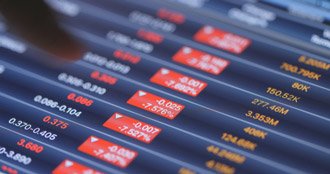The media loves bad news. It's no wonder making recession predictions is big business. It seems like you're always seeing someone on TV predicting a market crash or recession.
So how do you know when to take the risk of recession seriously?
The reality is no one can predict the timing of a recession or market correction with any accuracy, but there are some warning signs to pay attention to.

One of the most popular arguments says the bull market is already the longest on record at nearly 11 years, so either all the easy money has been made or it "has" to be coming near its end. In other words, the economy has reached the end of its up cycle. And because the bull has run for so long, the inevitable bear market could be worse than usual.
That might sound compelling, but just because something hasn't happened in a long time doesn't mean it has to happen soon. The bull market could power on for another decade for all we know.
But you might dig in a bit deeper and see rising oil prices and a slowdown in productivity thanks to the trade war. Those are more concrete signs the economy may be slowing. Of course, the trade war could end, kicking manufacturing back into gear.
Then there's last summer's inverted Treasury yield curve. History shows that once it normalizes again, a recession is likely to follow within 15 months.
That's likely why a survey of economists by Bankrate shows a 55% probability of a recession in 2020. Even well-respected economists like Ed Yardeni are saying a 10-20% correction is possible this year, too.
That doesn't mean a recession is going to happen, but the evidence is starting to pile up.
If you are the least bit worried that stocks are ripe for a pullback thanks to recession risk, here's what to do...
How to Protect Your Money from Recession Fears
[mmpazkzone name="in-story" network="9794" site="307044" id="137008" type="4"]
We're not saying to sell your stocks and put your cash under your mattress. Not even close. We just want to recognize that there are troubles out there that could potentially affect stocks, whether it is tensions with North Korea, political fallout here at home, or the volatile situation in the Middle East that could affect oil prices.
And just this week, Moody's chief economist told CNN Business that "while recession in 2020 has become less likely, recession early in the next decade remains a serious threat."
If you're in all stocks or are going to need your money soon for retirement or a big purchase, it might be a good idea to add a hedge to your portfolio right now.
First, let's say up front that we are not predicting a recession - and especially not one that comes with a market crash. We just want our readers to know about everything so they can be prepared.
In this case, it's not time to panic and sell, but it's the perfect time to think about a little diversification as a hedge. Specifically, we mean that now could be a good time to add a little bit of gold to your portfolio.
Just look at what happened in the second half of last year. Back in June 2019, gold broke out to the upside from a huge malaise dating back to 2013. After jumping to $1,560 by late August - a 13% gain - gold started to ease lower until mid-December, when it suddenly exploded higher again. It traded at $1,530 this week as money flowed strongly into gold stocks and ETFs.
If you like to look at charts, that's a six-year trading range below $1380 per ounce, and the bigger the base, the bigger the potential gains once the market breaks out.
In other words, gold has a solid foundation right now, which can send it shooting higher if the economy sputters or stocks take a tumble.
We like the SPDR Gold Shares ETF (NYSEArca: GLD) because it is actively traded, highly liquid, and readily available to individuals. It is bought and sold on the stock exchange just like any stock, so it is easy to trade and easy to hold.
Adding a bit to your portfolio right now will help ease your worries about a recession in 2020.
YOU KNOW IT IN YOUR GUT: Look at how things are going. Financial turmoil is coming just around the corner, maybe just a few months away. Click here...


